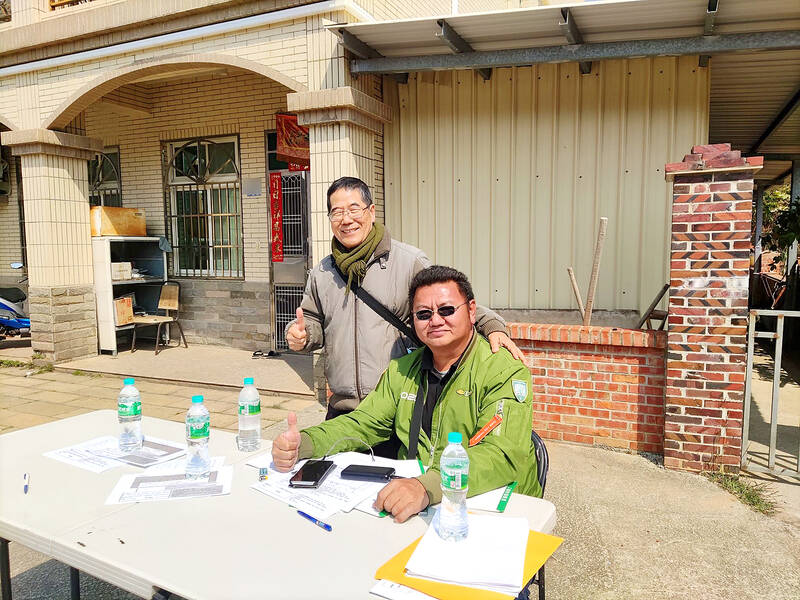President William Lai (賴清德) on Tuesday promulgated amendments to the Public Officials Election and Recall Act (公職人員選舉罷免法) that tighten requirements for petitions used to initiate the recall of elected officials, after the Legislative Yuan rejected a revote requested by the Cabinet last week.
The amendments take effect three days after the promulgation.
The amendments to the act, proposed by Chinese Nationalist Party (KMT) legislators and backed by their counterparts from the Taiwan People’s Party, were passed by a majority of lawmakers on Dec. 20 last year.

Photo courtesy of Wong Ming-chih
The newly amended law requires people initiating a recall petition and those who sign up to such an initiative to provide photocopies of their identification cards when submitting petition signatures.
In the past, campaigners only had to present the ID numbers and registered addresses of those endorsing a recall petition to local election commissions, a process critics said had been abused.
The new law also includes punitive measures, stipulating that anyone found guilty of using someone else’s identification or forging an ID for a recall petition could face up to five years in prison or a fine of up to NT$1 million (US$30,536).
The Executive Yuan has argued that the amended recall act would “exceedingly restrict” the public’s right to recall elected officials and “significantly increase the burden” of local electoral authorities.
The Cabinet on Jan. 24 requested the legislature to reconsider the amendments based on the provisions of the Constitution, saying it would be difficult to execute.
However, the Legislative Yuan on Tuesday last week voted to uphold the new legislation and sent it to the Presidential Office a day later, paving the path to its promulgation by Lai on Tuesday.
Democratic Progressive Party (DPP) caucus chief executive Rosalia Wu (吳思瑤) on Tuesday said that the party would follow the Constitution and seek a remedy.
The DPP is to go to the Judicial Yuan at 10:30am today to request an injunction and constitutional interpretation of the amendments, DPP caucus whip Ker Chien-ming (柯建銘) said yesterday.
However, the newly amended Constitutional Court Procedure Act (憲法訴訟法) mandates that a minimum of 10 grand justices hear and rule on a case, and an unconstitutional ruling be supported by at least nine justices.
Currently, the Constitutional Court has only eight grand justices, as the Legislative Yuan has declined to approve a new slate of nominations put forward by Lai in December last year.
Meanwhile, recall campaigners in Kinmen County yesterday rushed to compile signatures and submit a petition to recall KMT Legislator Chen Yu-jen (陳玉珍) before the new amendments take effect.
The campaigners set up signing stations and delivered the petitions on a flight to Taipei, recall campaign leader Wong Ming-chih (翁明志) said.
This is a chance to convey Kinmen’s true values and amplify Kinmen’s voice, Weng said.
Additional reporting by Chen Cheng-yu and Wu Cheng-ting

The Ministry of Economic Affairs has fined Taobao NT$1.2 million (US$36,912) for advertisements that exceed its approved business scope, requiring the Chinese e-commerce platform to make corrections in the first half of this year or its license may be revoked. Lawmakers have called for stricter enforcement of Chinese e-commerce platforms and measures to prevent China from laundering its goods through Taiwan in response to US President Donald Trump’s heavy tariffs on China. The Legislative Yuan’s Finance Committee met today to discuss policies to prevent China from dumping goods in Taiwan, inviting government agencies to report. Democratic Progressive Party Legislator Kuo Kuo-wen (郭國文) said

The Ministry of Economic Affairs has fined Taobao NT$1.2 million (US$36,900) for advertisements that exceeded its approved business scope and ordered the Chinese e-commerce platform to make corrections in the first half of this year or its license would be revoked. Lawmakers have called for stricter supervision of Chinese e-commerce platforms and more stringent measures to prevent China from laundering its goods through Taiwan as US President Donald Trump’s administration cracks down on origin laundering. The legislature’s Finance Committee yesterday met to discuss policies to prevent China from dumping goods in Taiwan, inviting government agencies to report on the matter. Democratic Progressive Party

Taiwan and its Pacific ally Tuvalu on Tuesday signed two accords aimed at facilitating bilateral cooperation on labor affairs, according to Taiwan’s Ministry of Foreign Affairs (MOFA). The governments inked two agreements in Taipei, witnessed by Foreign Minister Lin Chia-lung (林佳龍) and visiting Deputy Tuvaluan Prime Minister Panapasi Nelesone, MOFA said in a news release. According to MOFA, the agreements will facilitate cooperation on labor issues and allow the two sides to mutually recognize seafarers’ certificates and related training. Taiwan would also continue to collaborate with Tuvalu across various fields to promote economic prosperity as well as the well-being of their

Sung Chien-liang (宋建樑), who led efforts to recall Democratic Progressive Party (DPP) Legislator Lee Kun-cheng (李坤城), was released on bail of NT$80,000 today amid outcry over his decision to wear a Nazi armband to questioning the night before. Sung arrived at the New Taipei District Prosecutors’ Office for questioning in a recall petition forgery case last night wearing a red armband bearing a swastika, carrying a copy of Adolf Hitler’s Mein Kampf and giving a Nazi salute. Sung left the building at 1:15am without the armband and covering the book with his coat. Lee said today that this is a serious